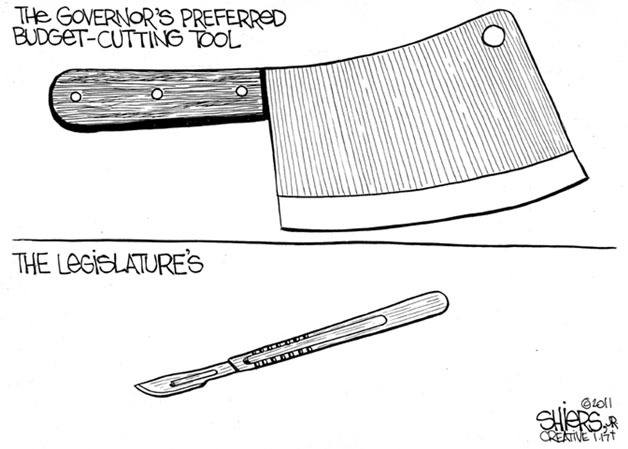About a month ago, the 2011 regular session of the Legislature convened in Olympia. As this session is taking place in an odd-year, the principal item of business will be to come up with a budget for the next biennium.
Since the Great Recession hit, writing budgets has become an extremely unpleasant task. The House, the Senate, and Gov. Gregoire have already used every conceivable means of mitigation available to offset painful cuts.
But now lawmakers are out of options. Congress isn’t going to come to their rescue with a second American Recovery and Reinvestment Act. And Initiative 1053 unconstitutionally prevents them from raising badly needed revenue without a two-thirds vote. So all they can really do is decide how best to start dismantling state government.
Voters may not have realized it, but in saying yes to Initiative 1053 last November, they were approving a motion of no confidence in our system of representative government. Voters put senseless constraints on the very people who are best equipped to deal with our fiscal crisis.
Most voters don’t have degrees in law or public administration, or know much about writing complex budgets and delivering services. That explains why an astonishing 71 percent of respondents surveyed in a recent Elway poll believe that the state would have enough money to balance the budget if it simply eliminated “waste and fraud.”
If anything, Elway’s finding is a vindication of all the time and trouble conservatives have spent denigrating the public sector and undermining people’s trust in government.
The idea that our $5 billion-plus shortfall could be closed by eliminating waste is ridiculous. If it were that easy, lawmakers would have done it already; the Legislature can always be counted upon to take the lowest road. If they could save vital public services now by stopping fraud and getting rid of waste, they’d do it in a heartbeat.
We all have (or have heard) horror stories centered around the failings of bureaucracy, whether public or private. But “waste and fraud” simply doesn’t exist in government on the grand scale people have been led to believe. If it did, right-wing groups and candidates would be able to point it out. But they can’t. Whenever Tim Eyman is asked what he’d cut if he was in charge of the budget, he always dodges the question. If you don’t believe me, try asking him yourself.
In debates last fall, Republicans running for Legislature responded to the same “What would you cut?” questions with meaningless, canned answers about going through the budget “line by line” and rooting out waste. Often, the answers didn’t contain a single example of “wasteful spending.” The few examples that were provided (like the government printing office) amount to an insignificant fraction of state expenditures.
Ironically, pretty much everybody who says state expenditures are too high has their own sacred cow. Seattle Times editorial page editor Ryan Blethen recently penned a column decrying bills that would allow county governments to post public notices on the Internet instead of having to run them in newspapers. Not having to pay for newspaper ads would undoubtedly save us taxpayers a bit of money. But Blethen, whose editorial page endorsed I-1053 and has been whining about “overspending” for years, doesn’t like that because it would negatively affect his own business’ bottom line.
Then there’s Republican Senator (and I-1053 cosponsor) Pam Roach of Auburn who has been fighting for years to prevent the Rainier School – which serves the developmentally disabled – from becoming a victim of budget cuts. Why does Roach care about the Rainier School so much? Because it’s in her district.
If the Rainier School ends up getting shuttered this year, Roach will need to look no farther than a mirror to find the responsible party.
If waste is as rampant as Roach, Eyman, the Seattle Times, and other government bashers say it is, they should be able to show us where it is. But they can’t.
The reality is, if we want to continue benefiting from the essential public services we’ve come to rely on, we’re going to need to find a way to pay for them … or watch our quality of life, and our chances of an economic recovery, disappear.
Andrew Villeneuve is the founder and executive director of the Northwest Progressive Institute, a Redmond-based grassroots organization. Villeneuve can be reached at andrew@nwprogressive.org.



